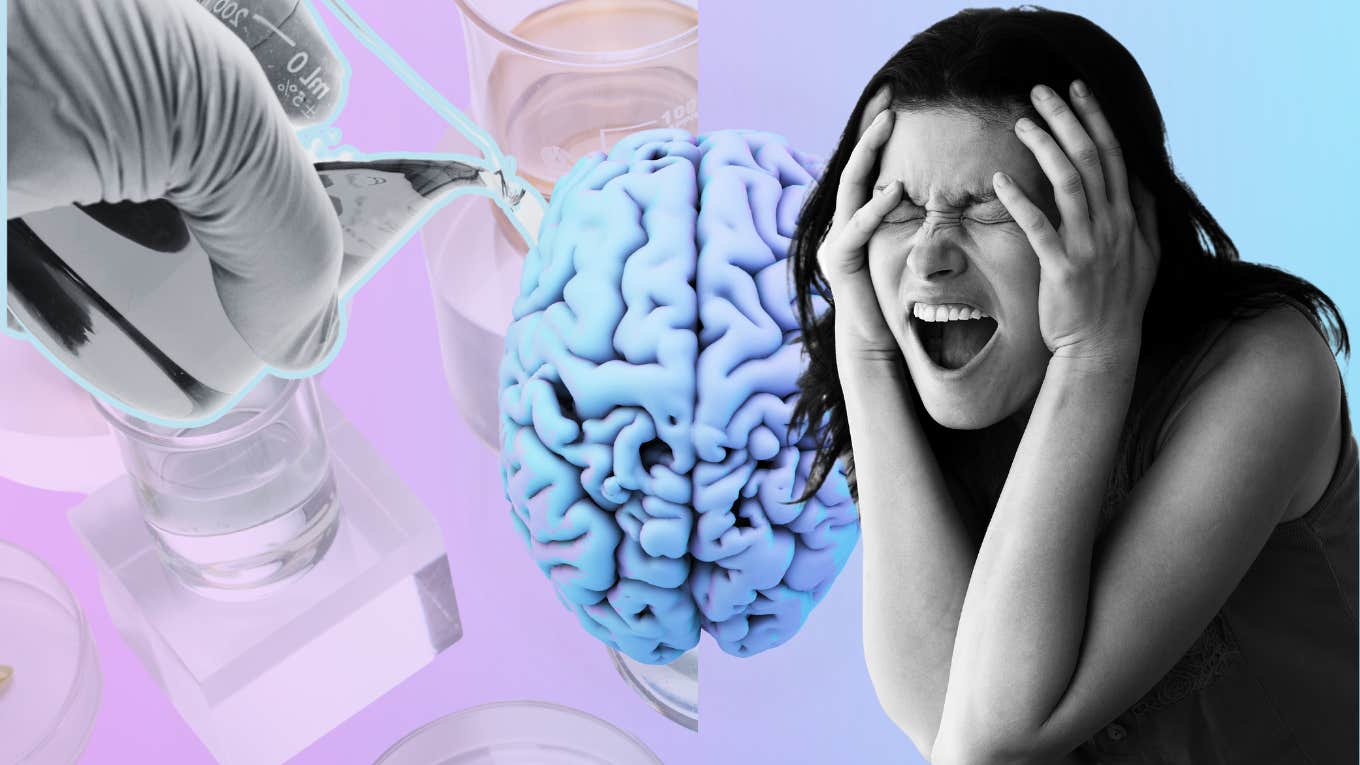3 Powerful Ways Your Brain Impacts Addiction
The research behind addiction.
 McLittle, Junessa Rendon, blackwaterimages, ladi59 | Canva
McLittle, Junessa Rendon, blackwaterimages, ladi59 | Canva There is a common denominator that all forms of addiction share — whether your addiction is shopping, eating, co-dependency, or serial infidelity, a chemical reaction occurs, producing sensations that make you feel "okay." Each time you repeat that behavior, you create (and reinforce) a feel-good pattern in your brain. We all do it. How else would we survive the stresses of life? Neuroscience has an emerging theory that explains this pattern called Neuroplasticity.
Basically, in the primitive parts of the brain, neurons tell us how to think, feel, and store memory. Those signals, or neurotransmitters, cause heightened sensations in the body and store the powerful memories that, of course, we want more of! You get hooked on these feelings and therefore repeat the behavior, which reinforces the neurological pathway. As these synaptic networks strengthen, the behaviors become entrenched. Drug and alcohol addiction connect to this very neurobiology.
Why do good feelings turn into addictive "bad behaviors?" If it's an adrenaline-based behavior, you activate norepinephrine. This is an excitatory neurotransmitter. Challenging or risky behaviors often trigger this — extracurricular intimacy, gambling, shoplifting, and cocaine are typical examples. There is a "rush" quality to these behaviors. The prefrontal brain functions, judgment, and impulse control are significantly impaired, paving the way for repeated thrill-seeking behavior.
Dopamine is another chemical that floods the brain, attuning the system to pleasurable stimuli. Positive emotions and heightened arousal permeate the body during this mind-state, and the appeal of new relationships soar as dopamine levels climb. Think about the "intoxicating" mind-state of falling in love. Serotonin, which provides comfort and ensures homeostasis, actually decreases when one engages in risky behaviors. This leaves behind an unsettling feeling, which is why we cannot sleep or feel anxious and obsessed during this time.
Sound familiar? Low serotonin levels are at the root of many psychological and physical problems, hence why we use psychopharmacology to alter these levels so easily. We base many antidepressant categories on adjusting the levels of serotonin. Anxiety disorders are also closely correlated with serotonin fluctuation. The point of all this is to understand that addictive behaviors are real physiological conditions, not bizarre psychological weaknesses. Neurobiology now contributes to addiction treatment and gives us a better understanding of the reward-pathway stimulation — how and when to interrupt the cycle, and a de-stigmatization of shame.
How to interrupt the cycle of addiction and regain control:
1. Realize you don't need the vice, just the feel-good effects
Distinguishing here is critical. Giving power to the vice is diminishing the power within to stop the compulsive behavior. So, it's not the new shoes, the next line of cocaine, or the next text message you must send; rather, it's a feeling with an underlying new belief that is so vital to our existence. Yes, this is where psychodynamic therapy comes in.
2. Break out of denial
If it's imperative to obtain this state of mind, what's going on that doesn't feel so good? Where in your life are you short-changing yourself? In other words, if you need so badly to feel good, you probably haven't been feeling okay for a while and are compensating.
3. Find other things to bring into your life that make you feel authentically good
When we give something up, there is a void. This void is a good time to connect to healthier, more sustaining ways to feel good. You must realize that these new things may not have the rush quality of the former. Re-training the brain through mindfulness practices disrupts the cycle and diminishes the addictive draw. Through mindfulness we learn experientially about non-attachment, acceptance, and gratitude for what is, so we can stop chasing what is not. Disrupting the pattern takes work. Understanding the process is the first step.
Drug and alcohol addiction is incredibly common.
The Substance Abuse and Mental Health Services Administration (SAMHSA) reports that approximately 20.3 million people above the age of 12 have suffered from a substance use disorder in the past year. According to SAMHSA’s 2018 National Survey on Drug Use and Health, close to 2 million people of the same age bracket have suffered from opioid use disorders and 14.8 million from alcohol use disorders.
Misusing alcohol and other drugs can be detrimental to your immediate and long-term physical, emotional, and mental health.
Alcohol and drug addiction is something to take seriously, although often overlooked. Anyone of any race, age, sexual orientation, religion, or gender can suffer from alcohol and drug addiction.
Recovering from an addiction is more than just abstaining from drugs or alcohol. It’s about investigating the internal framework of your brain, rewiring your thought patterns, and actively changing behaviors over a long period.
If you or someone you know is suffering from addiction, there are resources to get help.
The process of recovery is not linear, but the first step to getting better is asking for help. For more information, referrals to local treatment facilities and support groups, and relevant links, visit SAMHSA’s website. If you’d like to join a recovery support group, you can locate the nearest Alcoholics Anonymous or Narcotics Anonymous meetings near you. Or you can call SAMHSA’s National Helpline at 1-800-799-7233, which is a free 24/7 confidential information service in both English and Spanish. For TTY, or if you’re unable to speak safely, call 1-800-487-4889.
Katherine Mazza is a NY State Licensed Mental Health Therapist specializing in relationship issues, anxiety management, PTSD, and trauma.

